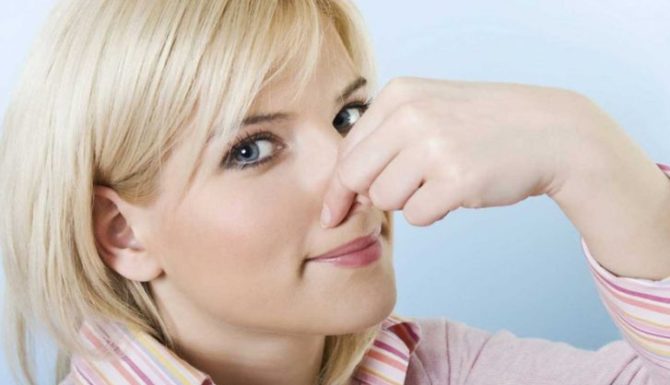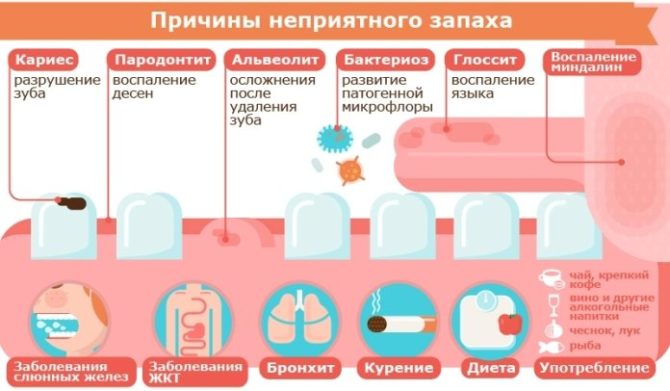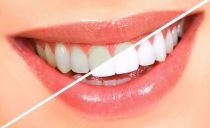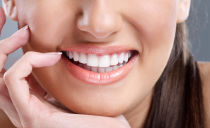Causes and treatment of halitosis
Bad breath (the medical term is halitosis) is not just a problem that interferes with people, Serious diseases often manifest themselves from the insidethat require timely diagnosis and elimination.
Stale breathing periodically causes discomfort to all people, but if it is persistent and does not go away even after daily hygiene procedures, it is imperative to identify the causes of halitosis and begin adequate treatment.
Content
How to determine if there is bad breath
Many people do not even suspect that they have bad breath, so they do not look for its causes. It’s not worth waiting for one of your friends to point out this shortcoming. Many relatives are afraid to offend a loved one, while colleagues and unfamiliar ones will simply minimize such communication. Therefore, it is advisable for everyone to periodically check themselves for the presence of halitosis.
There are several ways to help identify bad breath:
- Using the wrist. You need to lick your wrist, wait a few seconds and smell it. This is the smell from the mouth, or rather, from the tip of the tongue. The front of the tongue smells much better than the back, as it is well cleansed by saliva, which contains various antibacterial components.
- Using palm. It is necessary to make a sharp exhale in the palm of your hand and quickly sniff its contents. People smell about this smell from the oral cavity.
- Using a spoon. If you hold an inverted spoon on the surface of the tongue, you can collect a certain amount of white plaque, by the smell of which you can determine whether bad breath is present.
- Using jars. It is necessary to exhale sharply in a small clean plastic or glass jar and tightly close the container with a lid. After about five minutes you can open the jar and smell the contents.
Also, the appearance of the oral cavity may indicate the condition of the mucosa. Inspection can be done independently at home in front of the mirror. The back of the tongue should have the same pinkish tint as the entire oral cavity. The presence of white, brown or creamy plaque, the presence of an unpleasant taste in the mouth indicates violations and possible halitosis.
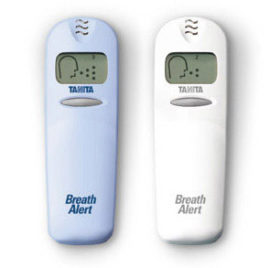 In modern medicine, there are quite effective methods for diagnosing bad breath. One of the most affordable and convenient is the use of a halimeter device. Using a halimeter, you can determine the strength of an unpleasant odor, as well as monitor progress during treatment.
In modern medicine, there are quite effective methods for diagnosing bad breath. One of the most affordable and convenient is the use of a halimeter device. Using a halimeter, you can determine the strength of an unpleasant odor, as well as monitor progress during treatment.
In laboratory conditions, microbiological studies are carried out that help to identify the presence of pathogenic bacteria, which are the cause of halitosis.
Doctors divide halitosis into the following types:
- True. Bad breath is felt by others during communication. Likely hygiene, metabolic disturbances in the body, and particular physiology of a particular person are likely causes of this terrible smell. Very often stale breathing is just a symptom of some kind of internal disease.
- Pseudogalitosis. It smells bad, but not very strong, and only close people can feel it with direct contact.In such cases, it is often found that the cause of stench from the mouth is poor oral hygiene.
- Halitophobia. A physically healthy person is convinced that he has a bad breath, but neither the people around him nor the doctor confirm this. This mental disorder is treated exclusively by a therapist; no other specialists can help.
Bad breath: causes
The main source of bad breath is the vital activity of the anaerobic bacteria located there. They emit volatile sulfur compounds, which are smelly gases.
There are a number of factors that contribute to the multiplication of these anaerobic bacteria:
- Inflammatory gum disease (periodontitis, gingivitis), which arise due to the accumulation of soft microbial plaque, tartar. Microorganisms accumulated in stone or plaque begin to secrete so many toxins that local immunity does not provide adequate protection. As a result, an inflammatory process occurs in the gums.
 Caries. A huge number of pathogenic microorganisms accumulate in carious formations. The remains of food are also clogged there, which later rot, which causes a bad breath.
Caries. A huge number of pathogenic microorganisms accumulate in carious formations. The remains of food are also clogged there, which later rot, which causes a bad breath.- Stomach diseases (ulcers, gastritis) in the presence of pathology of non-closure of the esophageal sphincter. Unpleasant odors from the stomach pass through the esophagus into the oral cavity, which is the reason for the specific smell from the mouth.
- Tartar. When the calcium salts harden, a chronic infectious process develops in it. Often tartar can appear due to the pathology of the gums - gingival pockets.
- Chronic tonsillitis. With the slightest weakening of the immune system, the inflammatory process in the tonsils resumes, which causes an unpleasant odor.
- Glossitis. This is an inflammatory process that occurs in the shell of the tongue.
- Stomatitis. The appearance of ulcers and white plaque on the oral mucosa. It is this plaque and ulcers that cause bad breath, you must go to the dentist with it.
- Intestinal pathology (colitis, enteritis). With inflammatory processes in the digestive tract, toxins enter the bloodstream. The body removes toxic substances through the lungs, which is why there was a smell from the mouth.
- Helminthiasis. Intestinal parasites can cause stagnation in the intestines, causing stale breathing.
Also, the causes of bad breath can be hidden in lifestyle and nutrition:
- Inadequate Hygiene. If an absolutely healthy person does not use dental floss and does not extract food residues between the teeth, over time, these clusters will decay and begin to exhale bad breath.
A large number of bacteria accumulate on the back of the tongue, so when brushing your teeth you should not leave this place unattended - it must be cleaned with a special brush located on the back of the toothbrush.
- Wearing dentures. Leftovers may accumulate in the dentures. The polymer base of the prosthesis has the ability to absorb unpleasant odors, so even after eliminating the cause of halitosis, you can experience discomfort during communication. When installing a denture, the dentist should give advice on the continuous care of them, these recommendations should definitely be followed. After each subsequent cleaning, dentures must be placed in a special antiseptic liquid to get rid of the terrible aroma.
- Taking certain medications. Very often, antihistamines, diuretics and antidiabetic agents cause dry mucous membranes and, as a result, bad breath.
- Eating Pungent Flavors. Onions, garlic, too fatty meat foods can cause an unpleasant odor, which should pass on its own soon enough.
- Smoking. If you constantly smoke and are interested in why there is a bad breath and how to get rid of it, it is worth considering that this feature is often associated with smoking and chewing tobacco. Tobacco products dehydrate the mucous membranes and release harmful chemicals that linger in the oral cavity, causing bad breath. If quitting smoking does not quit, you need to carefully monitor the cleanliness of the oral cavity.
- Alcohol intake. Alcohols cause xerostomia (chronic dry mouth), therefore fetid bacteria multiply rapidly and begin to secrete hydrogen sulfide substances. The stench also appears after drinking various alcoholic beverages and fatty snacks, which enter the stomach through the esophagus into the oral cavity. Over the years, the salivary glands begin to function worse, so the smell after a holiday in the mouth of an elderly person is much stronger than that of a student.
- Overdried mucous membranes. Saliva effectively moisturizes, cleanses, washes dead cells and plaque. If saliva is not enough, the cells on the gums, tongue, inner surface of the cheeks decompose and cause halitosis. Dryness is the result of certain pathologies, taking medications or alcoholic beverages. People of certain professions are more prone to overdrying the oral mucosa due to the nature of their activity; these are lawyers, teachers, doctors who have to talk a lot during the day. All diseases that cause nasal congestion (allergies, rhinitis, etc.) lead to mucosal drying.
- Stress, nervous strain. The manifestation of a terrible smell will disappear immediately after the normalization of the mental state.
- Diet, starvation, overeating with fatty, hard-to-digest foods. Hunger leads to the fact that with a lack of fats and proteins, the human body begins to utilize endogenous reserves, which leads to bad breath, so you need to eat fully and on time.
Whatever the cause of bad breath, the source is still pathological bacteria. They are always in the mouth and are activated only under certain circumstances.
How to identify a problem in the body by breathing
 The hydrogen sulfide smell (like rotten eggs) indicates that the body is rotting protein substances. If this symptom is accompanied by bloating, sharp pains in the abdomen, especially after eating, belching, nausea, diverticulosis of the esophagus or stomach, gastritis with low acidity, ulcer should be excluded. Often stinks from the mouth after feasts, that is, as a result of overeating.
The hydrogen sulfide smell (like rotten eggs) indicates that the body is rotting protein substances. If this symptom is accompanied by bloating, sharp pains in the abdomen, especially after eating, belching, nausea, diverticulosis of the esophagus or stomach, gastritis with low acidity, ulcer should be excluded. Often stinks from the mouth after feasts, that is, as a result of overeating.- Sourish taste and smell means gastritis with high acidity, gastrointestinal ulcer, various diseases of the esophagus.
- Taste and smell of bitterness, yellow plaque on the tongue, pain in the side - this is a manifestation of problems from the inside (in the gall bladder, liver).
- If the mouth smells of feces, you need to pay attention to the condition of the intestine, since this feature speaks of its obstruction, dyskinesia (motor neurosis), and dysbiosis.
- The sweet taste and smell of acetone may indicate diabetes mellitus or pancreatic disease.
- The smell of urine is a sign of diseased kidneys.
- The terrible smell of ammonia, which remains after hygiene and eating, means cystitis, polyneuritis, stones or an inflammatory process in the urethra.
How to treat a terrible smell
Treatment for bad breath depends on what exactly caused it and what stage the disease is at. Sometimes it is enough to improve the quality of the carried out hygiene procedures, but often it is necessary to get rid of diseases of the oral cavity and internal organs.
You can neutralize the unpleasant aftertaste and stench after eating or on an empty stomach as follows:
- drink a cup of strong tea;
- chew a coffee bean;
- eat an apple or carrot;
- chew a leaf of parsley, celery root, a slice of lemon.
At home, for freshness of breath, you can independently prepare natural conditioners:
 1 tbsp. l mix a mixture of chamomile, sage, strawberry and mint leaves with a glass of boiling water, let it brew until it cools completely. Rinse the resulting composition after each meal.
1 tbsp. l mix a mixture of chamomile, sage, strawberry and mint leaves with a glass of boiling water, let it brew until it cools completely. Rinse the resulting composition after each meal.- A tablespoon of oak bark pour 200 ml of boiling water, put in a water bath and boil for 30 minutes. Strain the broth and rinse the throat and oral cavity. Oak bark effectively cleans tonsils from plaque, strengthens the gums, prevents the appearance of an unpleasant odor.
- Add a few drops of natural eucalyptus essential oil to a glass of water and use to rinse. Eucalyptus oil disinfects the oral cavity well.
How to prevent halitosis
An unpleasant smell is much easier to prevent than to treat it later. Of great importance is oral hygiene. After each meal, it is very important to clean your teeth from small particles of food, which can subsequently decay and create favorable conditions for the reproduction of pathogenic organisms.
To prevent such causes of bad breath as tartar and plaque, you must constantly:
- brush your teeth with medium hard bristles after each meal, that is, several times a day;
- to clean the spaces between the teeth with dental floss;
- clean the surface of the tongue with a brush located on the back of the toothbrush, in the direction from the root to the tip;
- if it is not possible to brush your teeth after eating (at work, away), you can rinse your mouth with warm water or chew gum without sugar;
Do not abuse chewing gum, as they negatively affect the work of the digestive tract.
- adhere to the correct lifestyle, order of nutrition, introduce a sufficient amount of vegetables and fruits into your diet. This helps to normalize salivation;
- timely visit the dentist for the purpose of preventive examination and for dental treatment.
If oral hygiene is constantly given due attention and diseases of the oral cavity and internal organs are excluded, the unpleasant odor of saliva can be reduced with the help of special liquid cleaners in the form of liquid rinses or sprays.
Purifiers have antibacterial properties, due to which it is possible to reduce the number of anaerobic bacteria that emit volatile sulfur compounds. These compounds contain special substances that neutralize the vile aroma that these bacteria managed to separate, so that breathing becomes cleaner and more pleasant.
Caution should be given to the so-called antiseptic neutralizers: they contain alcohol, which overdries the mucous membrane, which is why the smell appears.
How to choose oral care products
When buying personal care products, you need to carefully study their composition. Only natural ingredients will help not only to mask bad breath with a different smell, but directly affect the causes of the problem.
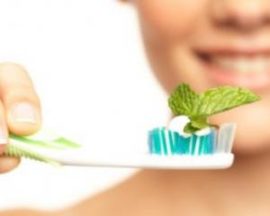 If you choose a toothpaste that contains alcohol in your composition, you may not be surprised why it smells bad from your mouth. Alcohol dries the mucosa, thereby contributing to the development of anaerobic microorganisms, that is, the very cause of stale breathing.
If you choose a toothpaste that contains alcohol in your composition, you may not be surprised why it smells bad from your mouth. Alcohol dries the mucosa, thereby contributing to the development of anaerobic microorganisms, that is, the very cause of stale breathing.
It is good if the care product contains antibacterial components that, through chemical reactions, reduce the manifestation of halitosis.
Which doctor should I go to cure bad breath
If halitosis occurs, you should initially consult a dentist. The doctor will examine the oral cavity for sores and inflammatory processes, conduct professional cleaning from plaque and stone, cure tooth decay, periodontitis and other diseases of the teeth and gums.
If the dentist’s treatment fails, the source of the unpleasant odor should be sought by doctors of a different profile: an ENT doctor (should exclude rhinitis and sinusitis), a pulmonologist (bronchiectatic disease), an endocrinologist (diabetes mellitus), and a gastroenterologist (stomach problems).
Halitosis is a problem that interferes with normal life, it lowers self-esteem, makes a person less sociable, unattractive to others.Therefore, bad breathing must be eliminated on time, do not neglect traditional hygiene procedures, you need to go to the dentist in time and visit other relevant specialists to check your health.

